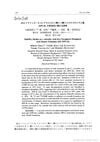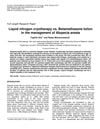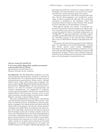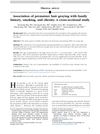 37 citations,
January 2011 in “Annals of Dermatology”
37 citations,
January 2011 in “Annals of Dermatology” ALA-photodynamic therapy helps reduce acne by causing acne cell death and lowering certain skin protein levels.
 7 citations,
March 2011 in “Expert Opinion on Drug Safety”
7 citations,
March 2011 in “Expert Opinion on Drug Safety” Exemestane is effective and safe for treating certain breast cancers, with mild side effects, but needs more research on long-term effects.
 4 citations,
January 1994 in “Yakugaku zasshi”
4 citations,
January 1994 in “Yakugaku zasshi” EPC-K is stable except at very acidic pH or when exposed to sunlight, and it can decompose in low ethanol concentrations.
 20 citations,
January 2003 in “Chemical and Pharmaceutical Bulletin”
20 citations,
January 2003 in “Chemical and Pharmaceutical Bulletin” The new progesterone derivatives effectively inhibit 5α-reductase and bind to the androgen receptor.
 January 2019 in “Journal of Pharmacognosy and Phytochemistry”
January 2019 in “Journal of Pharmacognosy and Phytochemistry” The methanolic fruit extract of Citrullus colocynthis contains bioactive compounds that may support its use in traditional medicine and drug development.
 12 citations,
March 2016 in “BBA clinical”
12 citations,
March 2016 in “BBA clinical” Increased Toll-like receptors in blood cells may contribute to alopecia areata and could be a target for new treatments.
 15 citations,
February 2013 in “Journal of Clinical Medicine and Research”
15 citations,
February 2013 in “Journal of Clinical Medicine and Research” Liquid nitrogen cryotherapy and betamethasone lotion are equally effective for treating alopecia areata.
 27 citations,
October 2016 in “The Journal of Clinical Endocrinology and Metabolism”
27 citations,
October 2016 in “The Journal of Clinical Endocrinology and Metabolism” Daughters of women with PCOS generally experience normal puberty but may have more body hair and different body fat distribution.
 January 2024 in “JCEM case reports”
January 2024 in “JCEM case reports” This is the first known case of parathyroid cancer in a patient with Birt Hogg Dube Syndrome.
 20 citations,
July 2020 in “Expert Opinion on Biological Therapy”
20 citations,
July 2020 in “Expert Opinion on Biological Therapy” Using micro-needling, low-level laser therapy, and platelet-rich plasma together significantly improves hair growth in people with hair loss.
 2 citations,
December 2022 in “PNAS nexus”
2 citations,
December 2022 in “PNAS nexus” SCD-153 shows promise as an effective topical treatment for alopecia areata.
 46 citations,
December 2014 in “Journal of The American Academy of Dermatology”
46 citations,
December 2014 in “Journal of The American Academy of Dermatology” Premature hair graying in young men is linked to family history, obesity, and smoking.
 22 citations,
February 2017 in “Clinical and Experimental Dermatology”
22 citations,
February 2017 in “Clinical and Experimental Dermatology” Icariin helps mouse hair grow by boosting a growth factor in skin cells.
 5 citations,
June 2022 in “Frontiers in immunology”
5 citations,
June 2022 in “Frontiers in immunology” Increasing Treg cells in the skin does not cure hair loss from alopecia areata in mice.
 75 citations,
November 1996 in “Fertility and Sterility”
75 citations,
November 1996 in “Fertility and Sterility” Finasteride effectively reduces hair growth in women with idiopathic hirsutism, but requires careful contraception during treatment.
 2 citations,
January 2016 in “Journal of Steroids & Hormonal Science”
2 citations,
January 2016 in “Journal of Steroids & Hormonal Science” Women with PCOS and polycystic ovaries have higher male hormone levels and more insulin resistance, especially if they are overweight.
 31 citations,
May 2021 in “Journal of endocrinological investigation”
31 citations,
May 2021 in “Journal of endocrinological investigation” APS-1 in Italy shows diverse AIRE mutations and various autoimmune issues.
 19 citations,
January 2016 in “Annals of Dermatology”
19 citations,
January 2016 in “Annals of Dermatology” Dutasteride is safe and effective for treating hair loss, but may decrease libido.
 18 citations,
June 2019 in “Clinical research in dermatology”
18 citations,
June 2019 in “Clinical research in dermatology” Acne can't be cured but can be managed with treatments like benzoyl peroxide and diet changes; it's costly and can lead to scarring and mental health issues.
 71 citations,
November 2013 in “Clinics in Dermatology”
71 citations,
November 2013 in “Clinics in Dermatology” Acne is a chronic disease linked to various systemic conditions and has significant psychological and social effects.
 4 citations,
December 2015 in “Journal of Medicinal Plants Research”
4 citations,
December 2015 in “Journal of Medicinal Plants Research” A plant mixture extract helped grow hair by boosting cell growth and growth factors while blocking a hair loss-related enzyme.
 2 citations,
September 2022 in “Cellular and molecular biology”
2 citations,
September 2022 in “Cellular and molecular biology” Agaricus bisporus derived β-Glucan could be an effective cervical cancer treatment with antimicrobial and antioxidant properties.
 June 2023 in “Oriental Journal of Chemistry/Oriental journal of chemistry”
June 2023 in “Oriental Journal of Chemistry/Oriental journal of chemistry” New compounds may help treat prostate cancer by reducing cell growth.
 15 citations,
July 2019 in “Journal of Investigative Dermatology”
15 citations,
July 2019 in “Journal of Investigative Dermatology” CBD can either reduce inflammation and not affect hair growth at low levels or inhibit hair growth at high levels.
 991 citations,
January 2011 in “Nature Reviews Endocrinology”
991 citations,
January 2011 in “Nature Reviews Endocrinology” The document concludes that PCOS is a complex disorder caused by both genetic and environmental factors, affecting women's health in various ways, and requires personalized treatment.
 April 2024 in “International journal of clinical trials”
April 2024 in “International journal of clinical trials” SesZen-Bio™ improves hair density, thickness, and overall hair health.
 June 2023 in “Trichology and cosmetology:”
June 2023 in “Trichology and cosmetology:” Ageratum Conyzoides, when taken orally, can effectively reduce hair loss and improve hair growth.
 117 citations,
May 2017 in “Human Reproduction Update”
117 citations,
May 2017 in “Human Reproduction Update” The update highlights that non-classic congenital adrenal hyperplasia is common in women with excess male hormones, requires specific hormone tests for diagnosis, and has various treatment options depending on age and symptoms.
 12 citations,
December 1987 in “Cancer Chemotherapy and Pharmacology”
12 citations,
December 1987 in “Cancer Chemotherapy and Pharmacology” Vitamin E in the diet might help protect against hair loss caused by the chemotherapy drug doxorubicin in rabbits.
 4 citations,
August 2016 in “JEADV. Journal of the European Academy of Dermatology and Venereology/Journal of the European Academy of Dermatology and Venereology”
4 citations,
August 2016 in “JEADV. Journal of the European Academy of Dermatology and Venereology/Journal of the European Academy of Dermatology and Venereology” Using cetirizine on the skin and taking vitamin D can help increase hair growth in children with hair loss from ectodermal dysplasia.






























